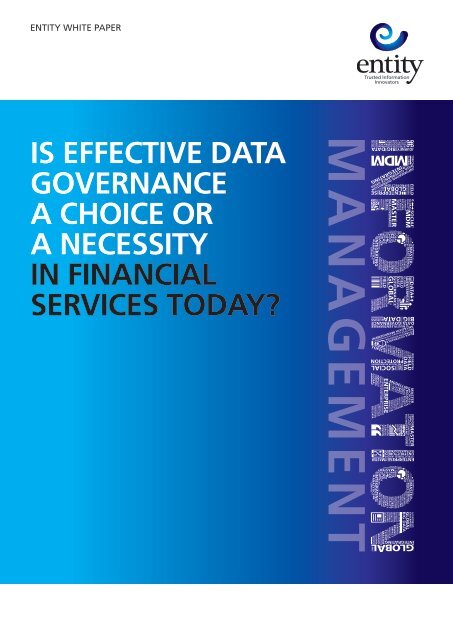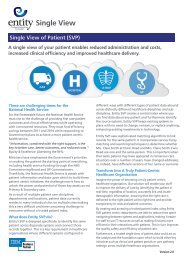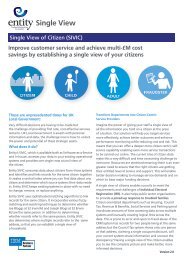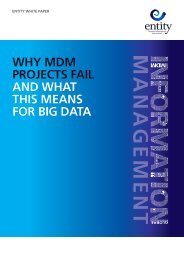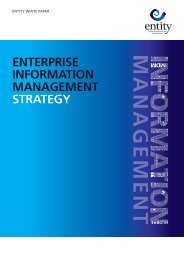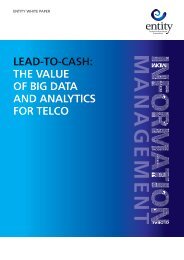MDM_Whitepaper_EDG_Finance
You also want an ePaper? Increase the reach of your titles
YUMPU automatically turns print PDFs into web optimized ePapers that Google loves.
ENTITY WHITE PAPER<br />
IS EFFECTIVE DATA<br />
GOVERNANCE<br />
A CHOICE OR<br />
A NECESSITY<br />
IN FINANCIAL<br />
SERVICES TODAY?
ENTITY WHITE PAPER IS EFFECTIVE DATA GOVERNANCE A CHOICE OR A NECESSITY IN FINANCIAL SERVICES TODAY?<br />
IS EFFECTIVE DATA GOVERNANCE<br />
A CHOICE OR A NECESSITY<br />
IN FINANCIAL SERVICES TODAY?<br />
INTRODUCTION<br />
The global banking industry is experiencing a period of uncompromising change that will<br />
permanently alter its shape, its ways of doing business, its winners and its losers.<br />
“Flowing complete, accurate, timely data to the people and processes<br />
that need it is the lifeblood of a modern organisation.”<br />
Ambuj Goyal, IBM<br />
Data Governance is the activity of co-ordinating people, processes and systems to ensure<br />
that the information that powers an enterprise is accurate and trustworthy.<br />
COST OF COMPLEXITY WITHIN BANKING SYSTEMS<br />
While the banking industry was one of the first to adopt the concepts of Enterprise Data<br />
Management, there is still a lot to do; effective Data Governance is a moving target and is<br />
still a distant dream for the vast majority of enterprises.<br />
In the last decade, the finance industry has witnessed constant mergers and acquisitions<br />
as the market has consolidated. This adds to an already complex system architecture map<br />
for most of these large organisations. Numerous legacy systems, a proliferation of product<br />
centric silos and duplicated data results in costly manual intervention and a loss of control.<br />
The integration of multiple systems over time has led to business rigidity rather than<br />
flexibility. In 2011, IBM’s Institute for Business Value estimated the cost of complexity for<br />
global banks to be $200bn.<br />
REGULATORY REFORM<br />
The 2008 financial crisis triggered an ongoing period of global and national regulatory<br />
reform. Banks are subject to a bewildering array of regulation including AML, KYC, SAMA,<br />
BASELII and Dodds-Frank and are fined huge sums for non-compliance. According to the<br />
2012 Ernst and Young survey, “Progress in Financial Services Risk Management”, the scope,<br />
timing and potential impact of regulatory reform was the top challenge noted by almost<br />
75% of respondents.<br />
Regulatory reform necessitates making risk “everyone’s business”. Modern Banking<br />
is both “data driven” and “data dependent”. It logically follows therefore that the<br />
effective management of the data in the enterprise should be everyone’s business. To<br />
truly make it so and by treating data as an “Enterprise Asset” requires an effective Data<br />
Governance programme.<br />
Regulation relating to capital requirements in banking groups (also known as regulatory<br />
capital or capital adequacy) will also create ripples along the information management<br />
supply chain. Investment banking operations are being ring-fenced, and regulators require<br />
that these operations report risk both independently and at group level. This will strain<br />
banking systems’ architecture, integration, data quality and Data Governance processes.<br />
2<br />
Failure to provide regulators with the information they require, in the format they require, when<br />
they ask for it, adds reputational risk to the plethora of risks already facing a modern bank.
IS EFFECTIVE DATA GOVERNANCE A CHOICE OR A NECESSITY IN FINANCIAL SERVICES TODAY? ENTITY WHITE PAPER<br />
Compliance is largely a costly and painful activity whose prize is the right to operate. From<br />
a data management perspective, however, its side effects are hugely beneficial as trusted,<br />
quality data that is available and usable in an appropriate form, at the point of need,<br />
has major advantages. These benefits can be felt in all business functions, whether retail<br />
banking, commercial banking, finance, risk, or marketing.<br />
CUSTOMER CENTRICITY<br />
Historically, the banking business model was built in product centric silos and paid no heed<br />
to a holistic view of the customer relationship. Today, however, customers expect banks to<br />
offer them the right products, at the right price, when they need them (e.g. at important<br />
milestones in their lives), and wherever they choose to buy them. All channels, whether at<br />
the branch, through customer service, online, or via mobile banking, should be incorporated.<br />
This requires trustworthy, relevant, consistent and timely information about customers. An<br />
enterprise level single view of customer data, spanning all aspects of the customer relationship<br />
and including household and social data, is fundamental, to be able to offer the right product<br />
combination, in real time, and to maximise cross-sell and up-sell opportunities.<br />
Social media is changing the manner in which a bank communicates with many of its<br />
customers. It provides the opportunity for retail banks to communicate with, listen to,<br />
and build strong relationships with its customers. This improved interaction, however, will<br />
also heighten customer expectations. Not only do customers want 24/7 banking from an<br />
organisation that understands their particular circumstances but they also want immediate<br />
answers to their key financial questions, and they will gravitate towards organisations<br />
that can provide them. This will continue to fuel further rapid change in the industry. To<br />
capitalise on the opportunities presented by social media, banks will need to include Big<br />
Data in their Information Management and Data Governance strategies.<br />
In a tough, mature market, with significant regulatory constraints, growth is reliant on<br />
nurturing the right relationships with the right customers.<br />
INFORMATION SECURITY & PRIVACY<br />
Research conducted by the Economic Intelligence Unit has identified that IT Security is high<br />
on banks’ list of priorities; this is understandable given the reputational risk associated with<br />
security breaches and data theft. With data managed across a complex network of internal<br />
and third-party systems, almost 90% of respondents in this report<br />
MANAG<br />
stated that failures have<br />
severe consequences for compliance.<br />
Furthermore, protecting personal data and preventing fraud is the minimum that customers<br />
expect from financial organisations. The cost of getting these wrong is high in terms of<br />
fines, loss of business and damage to the brand.<br />
Effective management of each of the above issues is essential for banks to achieve<br />
compliance and to retain and build competitive edge in this new era of banking.<br />
Transparent data for regulatory reporting, customer centricity to increase uptake of<br />
personalised financial products, trustworthy management reporting, and an enterprise view<br />
of risk and liquidity are the pillars on which this competitive edge can be built.<br />
The drivers for accurate and governed information at an enterprise level dominate today’s<br />
banking industry. Right now, effective Data Governance within banking is not a choice, but<br />
a necessity.<br />
3
ENTITY WHITE PAPER IS EFFECTIVE DATA GOVERNANCE A CHOICE OR A NECESSITY IN FINANCIAL SERVICES TODAY?<br />
WHAT IS DATA GOVERNANCE?<br />
Data Governance is the activity of co-ordinating people, processes and systems to ensure<br />
that the information that powers an enterprise is accurate and trustworthy.<br />
All enterprises rely on information from many sources, both internal and external, to<br />
feed critical business processes. Data Governance, if implemented effectively, can enable<br />
better decision making, reduced risk, regulatory and legal compliance, enhanced sales,<br />
enhanced customer satisfaction, business efficiency and reduced operational cost.<br />
Effective Data Governance plays a pivotal role in deriving value from the data the drives<br />
the organisation.<br />
WHY DO DATA GOVERNANCE PROGRAMMES SUCCEED OR FAIL?<br />
The probability of the success, or indeed the failure, of Data Governance programmes<br />
increases due to a number of factors.<br />
LACK OF AN IDENTIFIED BUSINESS PROBLEM<br />
A number of Data Governance initiatives fail because organisations implement them<br />
focusing purely on Data Quality without considering the context and scope of the business<br />
problem. Data Governance is too often implemented for the sake of Data Governance.<br />
Without a compelling strategic business driver that C-Level decision makers are aware<br />
of and care deeply about, the likelihood of obtaining Executive Sponsorship for a Data<br />
Governance programme is low. Furthermore, if the programme commences without clear<br />
definition of its objectives, board level backing will be finite as other, better specified<br />
projects compete for important resources; the programme will only progress if there are<br />
measurable and incremental results against strategic business drivers.<br />
It is therefore important to understand and define the specific business problems that a<br />
successful Data Governance initiative will address.<br />
In the main, in the banking industry, C-Level concerns relate to regulatory compliance, risk<br />
management, revenue generation, operational efficiency, decreased cost, customer loyalty,<br />
customer service and improved decision making.<br />
A specific business need might be to improve the identification of credit risk with respect to<br />
organisations with complex global ownership structures. In our experience, the foundation<br />
of this is rooted in data quality, master data management, hierarchy management and data<br />
governance principles. These contribute to customer onboarding and ongoing customer risk<br />
management processes.<br />
NS<br />
Alternatively, timely and accurate regulatory reporting is predicated on the ability to aggregate<br />
data in a consistent and meaningful form across many business units and geographies.<br />
Defining the business problems specify “WHY” an organisation is tackling Data Governance<br />
and what outcomes are expected. Individual Data Governance initiatives should align to<br />
business objectives – data quality processes, data stewardship, the technology utilised - all<br />
relate to “HOW” you get there.<br />
If an organisation allows process and technology to shape business decisions rather than<br />
the business priorities driving technology and process, then the business benefits hoped for<br />
from the Data Governance initiative will never be reached.<br />
4<br />
Conversely as a Data Governance programme incrementally tackles the identified business<br />
problems, it gains support from the business functions and momentum to extend its scope<br />
to additional areas.
IS EFFECTIVE DATA GOVERNANCE A CHOICE OR A NECESSITY IN FINANCIAL SERVICES TODAY? ENTITY WHITE PAPER<br />
OBTAIN EXECUTIVE SPONSORSHIP<br />
A passionate belief that data is the lifeblood of a modern organisation is essential at a very<br />
senior level if a Data Governance initiative is to be successful.<br />
Somebody at the top must own and care deeply about Data Governance and expect significant<br />
return on investment through its eventual implementation across the organisation. In order<br />
for Data Governance initiatives to be successful they require cross departmental thinking and<br />
organisational change and therefore need C-Level buy-in and leadership.<br />
Effective sponsorship at the right level in the business increases the probability of success with<br />
the Data Governance initiative. Executive level sponsors are more likely to fund projects that<br />
align with the strategic objectives for the organisation.<br />
In a banking context, one would expect the newly required (according to Dodds-Frank) Chief<br />
Risk Officer to be an Executive-Level sponsor, given the impact that accurate data has on the<br />
effective assessment of enterprise-wide risk. Support should also be forthcoming from other<br />
C-Level Executives including finance, marketing, customer service, retail banking, corporate<br />
banking and compliance, as each function is dependent on data to perform effectively.<br />
Effective sponsorship, however, requires a lot more than being an advocate for Data<br />
Governance and securing its funding. Effective sponsorship requires passionate leadership with<br />
a vision for business change, that the project is funded, and that you make those responsible<br />
for implementation accountable for realising the business benefits outlined in the business<br />
case. This awareness of accountability at the early stages of the Data Governance programme<br />
increases the probability of a successful implementation.<br />
BUSINESS CASE<br />
Executive-level sponsorship is more likely if the initiative is reinforced by a strong business case,<br />
with quantified Return-on-Investment.<br />
Executives must allocate resources to competing projects, and those with clearly identified<br />
benefits and value have more chance of moving forward. Furthermore, those projects without<br />
a clear business case are more likely to be cancelled or to be perceived as failures, simply<br />
because quantifiable business outcomes were not defined for the project at the outset.<br />
As with Master Data Management, Data Governance is an enabler of future value and its<br />
benefits can be realised across multiple business functions simultaneously, for example, finance,<br />
customer service, risk management and marketing. Example business cases might be expressed<br />
in terms of customer satisfaction, cross sell, up sell, operational efficiency, improvements to<br />
strategic decision making, or regulatory compliance.<br />
In the current post-recessionary climate, projects that progress also tend to be those whose<br />
value can be derived as a series of deliverables staged over time. ‘Big Bang’ initiatives where<br />
all the value is at the end of a multi-year programme have proven to fail all too often and<br />
therefore don’t even get off the starting blocks in the current climate.<br />
It is important to document, agree and continually measure the value of each business benefit,<br />
and when that value will be delivered.<br />
CONDUCT A MATURITY ASSESSMENT<br />
Before any Data Governance programme is initiated, you must first understand the maturity<br />
of the organisation in terms of existing policies, practices and processes. An assessment must<br />
also be made as to the desired/attainable future state (which may not be the perfect end state)<br />
but represents a sensible vision for Data Governance. This high level Data Governance Maturity<br />
5
ENTITY WHITE PAPER IS EFFECTIVE DATA GOVERNANCE A CHOICE OR A NECESSITY IN FINANCIAL SERVICES TODAY?<br />
Assessment will lead to recommendations in order to achieve a desired future state, and<br />
these recommendations will need to be prioritised as part of a Data Governance roadmap.<br />
The programme should deliver value incrementally and ultimately lead to Data Governance<br />
maturity across the entire organisation. Data Governance should become part of the DNA of<br />
the organisation and not a separate function.<br />
Failure to understand the gap between as is and to be and failure to measure processes and<br />
progress will inevitably lead to programme failure. Most organisations have an idea that<br />
they are not where they want to be, but not where that is or where they are. They never<br />
understand how to get there.<br />
It is important that all of the stakeholders across business units are involved in the<br />
assessment; ideally from business functions that will be improved by Data Governance,<br />
identified when defining the business problem.<br />
A Maturity Assessment should not be a one-off event. It should be conducted at regular<br />
intervals, to measure progress along the Data Governance Maturity Curve for the data<br />
relevant to the particular business issue being solved.<br />
The results of a Maturity Assessment should be documented and presented to senior<br />
decision makers, outlining next steps and priorities key to the success of the Data<br />
Governance programme. This helps to ensure continued buy-in and sponsorship.<br />
BUILD A ROADMAP<br />
Rolling out an effective Data Governance framework and discipline across a complex<br />
organisation is not simple, cannot be done overnight, requires buy in from multiple<br />
SOLUTION<br />
stakeholders and involvement from teams across the entire business. For these reasons, it<br />
is impossible to undertake a big bang approach to programme execution. Also, Executive<br />
Sponsorship tends to be predicated on successful delivery on an incremental basis and<br />
wanes rapidly if this is not forthcoming.<br />
The business problems to be solved, together with the Maturity Assessment, allow the<br />
identification of a reference architecture to support the strategic aims of the business. A series<br />
of smaller, prioritised by business case, more tactical projects can then be defined within the<br />
confines of an enterprise programme that deliver the strategy but in incremental units.<br />
These early wins facilitate continued Executive Level sponsorship as success and measurable<br />
Return-on-Investment give confidence that resources are being allocated appropriately.<br />
The roadmap should highlight the types and timings of Data Governance projects that<br />
deliver value on an incremental basis. Each project should stand to win its right to resources<br />
based on the strength of its individual business case within the programme structure. Key<br />
stakeholders should agree and understand which data domains will be governed (meta<br />
data, reference data, master data (customer, account, product, etc)) and how implementing<br />
policies and processes around them will impact and contribute value to the business.<br />
Drawing up a heatmap presenting a two dimensional matrix of all of the ‘information pains‘<br />
identified during the Maturity Assessment, with business value on one axis and investment<br />
on the other, provides an objective mechanism to prioritise implementation. It is an effective<br />
mechanism to derive and manage the programme roadmap over a period of time.<br />
6<br />
The Maturity Assessment enables Executive Level management to visualise the data maturity<br />
of key factors including data quality, data security, data auditability, data consistency, data<br />
accessibility and data availability across the organisation. Together with the heatmap, it<br />
enables the organisation to create the optimum roadmap for tackling projects incrementally<br />
with a view to deriving maximum business benefit as soon as possible.
IS EFFECTIVE DATA GOVERNANCE A CHOICE OR A NECESSITY IN FINANCIAL SERVICES TODAY? ENTITY WHITE PAPER<br />
Prioritising the delivery of these Data Governance initiatives, taking into account the practical<br />
considerations of resourcing service delivery, is not straight forward but leads to effective<br />
planning and management and therefore minimises the costs and timescales of implementation.<br />
The roadmap should also include, if it is not already in place, the creation of a Data<br />
Governance Council, which will be made up of those key decision makers whose business<br />
functions are affected by a lack of properly governed data. Within banks, depending on<br />
the business problem, C-Level Executives from risk management, compliance, finance, retail<br />
banking, corporate banking, customer service and marketing should consider participation.<br />
Any initial and periodic successes should be communicated widely across the organisation<br />
(as part of a structured communications plan) as this will facilitate the further adoption of<br />
Data Governance across the enterprise.<br />
CONCLUSION<br />
This paper has sought to highlight some the pressures facing the financial community in<br />
terms of compliance, security, privacy, customer service, market consolidation and business<br />
centricity. These are recognised as many of the major threats and opportunities in the<br />
financial world today.<br />
We have sought to highlight that in each case, the management of these threats and<br />
opportunities is exclusively down to the effective management and control of the data within<br />
the enterprise as an asset of that Enterprise. Data truly is the lifeblood of a modern organisation!<br />
For a financial organisation wishing to survive the pressures currently facing it and needing<br />
to enhance its competitiveness and agility, it is safe to say that effective Data Governance<br />
holds all of the cards. Effective Data Governance is not a choice, it is a necessity.<br />
Having drawn this conclusion, however, the world is littered with failed, stalled or<br />
ineffective Data Governance programmes that do not deliver value. This is largely because<br />
the value and complexity of a change programme that touches the entire organisation is<br />
not properly understood at the outset.<br />
Success is achieved through hard work and a strong enterprise level programme, a<br />
structured, iterative and agile approach with strong leadership and management, an<br />
operating group, operating model, reference architecture, data architecture, data<br />
management, data quality, data assurance, metrics and measures. Nobody said it would be<br />
easy, but the benefits to a modern financial services organisation are immense.<br />
Effective Data Governance is truly the key to business success in the 21st Century.<br />
ABOUT ENTITY GROUP<br />
SOLUTION<br />
Entity Group is an information management solutions specialist. Entity provides<br />
independent consultancy, software solutions and services that exploit the value<br />
of information and deliver competitive advantage to large scale clients across the<br />
information management lifecycle; its services range from an information management<br />
strategic review, through to analysis and implementation services for Big Data, data<br />
modelling, information integration, master data management and analytics.<br />
Entity provides information management services across the finance and insurance,<br />
pharmaceutical, automotive, media and utilities industries.<br />
Entity is committed to long term collaboration with our clients and partners, most of<br />
whom continue to work with us over many years and multiple projects. In addition to<br />
working directly with end-user organisations, Entity’s bespoke data management and<br />
domain expertise often sees the company called in to solve unusual or highly-challenging<br />
7<br />
business data issues on behalf of global IT services companies and software vendors.
For more information please contact:<br />
Sam Thomsett<br />
Marketing Manager, Entity Group<br />
sam.thomsett@entity.co.uk<br />
www.entity.co.uk<br />
Entity House<br />
980 Cornforth Drive<br />
Kent Science Park<br />
Sittingbourne<br />
KENT ME9 8PX<br />
United Kingdom<br />
www.entity.co.uk


